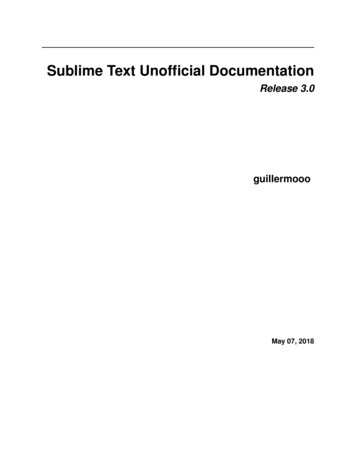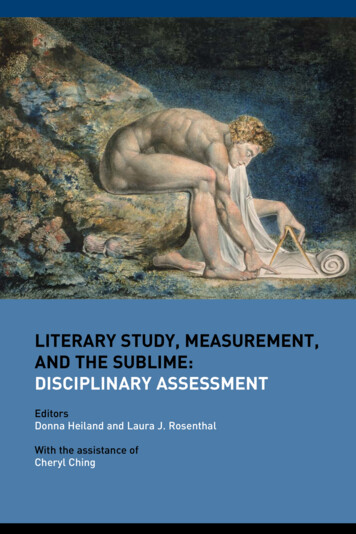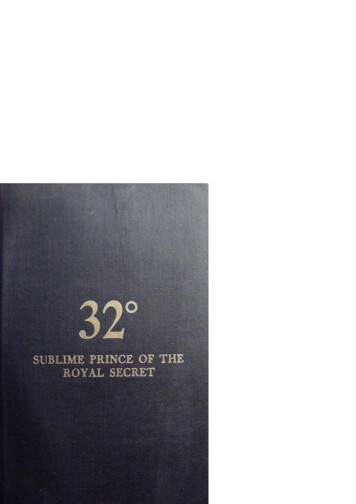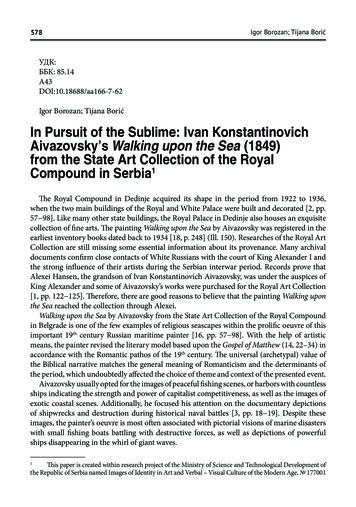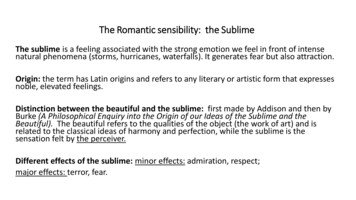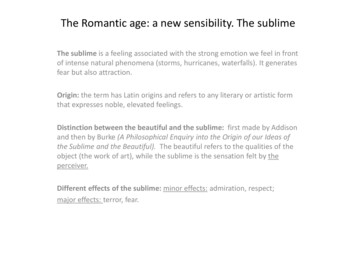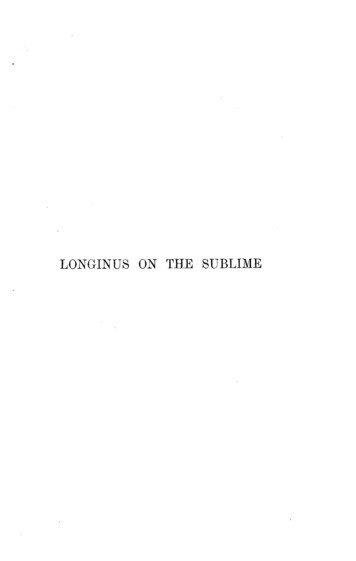
Transcription
LONGINUS ON THE SUBLIME
LONGINUSON THE SUBLIMETRANSLATED INTO ENGLISH BYH.L.HAVELL,B.A.FORMERLY SCHOLAR OF UNIVERSITY COLLEGE, OXFORDWITH AN INTRODUCTION BYANDBEW LANGILotttronMACMILLAN ANDAND NEW YORK1890All rights reservedCO.
TOS.H.BUTCHER,Esq.,LL.D.PROFESSOR OF GREEK IN THE UNIVERSITY OF EDINBURGHFORMERLY FELLOW OF TRINITY COLLEGE, CAMBRIDGEAND OF UNIVERSITY COLLEGE, OXFORDTHIS ATTEMPTTO PRESENT THE GREAT THOUGHTS OF LONGINUSINAN ENGLISH FORMISINDEDICATEDACKNOWLEDGMENT OF THE KIND SUPPORTBUT FOR WHICHITMIGHT NEVER HAVE SEEN THE LIGHTAND OF THE BENEFITS OF THATINSTRUCTION TO WHICH IT LARGELY OWESWHATEVER OF SCHOLARLY QUALITYITMAYPOSSESS
TRANSLATOR'S PREFACEThetextwhich has been followed in the presentTranslationisJahn (Bonn,that of1867), revisedbyIn severalin-Vahlen, and republished in 1884.stancesitVahlen' shas been found necessary to diverge fromsuchreadings,beingdivergenciesdulypointed out in the Notes.One wordTranslation.Mythemyoriginal.throughout has beenobjectmake Longinus speakas lay inaim and scope of the presentas to thein English, to preserve, as farpower, the nobleHowtotoeffectfireandthis,lofty tone ofwithout beingbetrayed into a loose paraphrase, was an exceedinglydifficultproblem.degree original,Thestyle ofLonginusoccasionally runningeccentricities of languagemade the attempt can;isin a highintostrangeand no one who has notrealise the difficulty of givinganything like an adequate version of the more elaborate passages.These considerations I submit to thosewhom I may seemmy text too freely.toat first sight tohave handled
TRANSLATOR'S PREFACEviiiMybest thanks are due to Dr. Butcher, ProfessorGreek in theoffromfirstUniversity ofto last hasshown aEdinburgh,wholively interest in thepresent undertaking which I can never sufficientlyHeacknowledge.and acting onout,inhas read the Translation throughhis suggestions Inumerous instanceswith thecloser conformityIhave alsotomyhave been ableversion into aoriginal.acknowledge the kindness of thedistinguished writerduction,to bringand who, inwho hascontributed the Intro-spite of theheavy demands onhis time, has lent his powerful support to helpworktheofonone who was personally unknown tohim.In conclusion, I may be allowedthat the present attempttoreawaken anclassic.mayinterest into express ahopecontribute somethingan unjustly neglected
—ANALYSISTheTreatiseas followsI.—cc.ii.The Work ofWhether Sublimityi,Sublime.II.—on the Sublime may be divided intocc.iii-v.:ment, Frigid Conceits.The—cc. vi, vii.TheDefinition ofCaecilius.falls[The beginningopposed to the SublimeIII.six Parts,:thewithin the rules of Art.lost.]VicesofStyleAffectation, Bombast, False Senti-cause of such defects.true Sublime, whatit is,and howdistinguishable.IV.limity—cc. viii-xl.isrelated to Passion,(i.)Five Sources of the Sublime (how Subc.viii,Grandeur of Thought,a.b.c.cc.ix-xv.As the natural outcomeExamples (c. ix).ChoiceoftheSappho's Ode»§§ 2-4).Amplification.most(c.of nobility of soul.strikingcircumstances.x).Plato compared with Demos-Demosthenes with Cicerothenes,d.Imitatione.Imagery(cc. xiii, xiv).(c.xv).(cc. xi-xiii).
ANALYSIS(ii.)Powerofmoving the Passions (omittedhere, be-cause dealt with in a separate work).(iii.)Figures of Speecha.The Figure(cc.xvi-xxix).of Adjurationconceal Art(c.The Artxvi).b.Rhetorical Questionc.Asyndeton (c. xix-xxi).Hyperbaton (c. xxii).Changes of Number, Person, Tense,d.e.toxvii).(c.(c. eful(cc. xxviii,Expressionxxix).and xxxvii,xxx-xxxii(cc.xx xviii).a.Choice of Wordsb.Ornaments(e.xxx).and xxxvii,of Style (cc. xxxi, xxxiixxxviii).(a)On(/?)Metaphorsthe use of FamiliarTimaeusabuse;tasteless conceits[HenceWordsaccumulated;;xxxi).(c.extract from theMetaphorsofarises adigressioncertain;blamed in Plato(c.(cc.xxxvi) on the spirit in whichxxxii).xxxiii-we shouldjudge of the faults of great authors.Demos-thenes compared with Hyperides, Lysiaswith Plato.Sublimity, however far fromfaultless, tobe always preferred to a tamecorrectness.](y) Comparisons and Similes ity and Elevation of Structurea.Modulation of Syllablesb.Composition(c. xl).(c.(cc.xxxix).xxxix,xl).
—ANALYSISV.— cc.(i.)(ii.)(iii.)(iv.)VI.Vices of Style destructive to Sublimity,xli-xliii.AbusexiofRhythm Broken and Jerky Clauses V(cc.UndueProlixityxli, xlii).JImproper Use of Familiar Words. Anti-climax.Example from Theopompus (c. xliii).— Whythiswhether the causegovernment,or, asageisissobarrenofgreatauthorsto be sought in a despoticform ofLonginus rather thinks, in the prevailingcorruption of manners, and in the sordid and paltry views oflifewhich almost universally prevail(c.xliv).
INTRODUCTIONTREATISE ON THE SUBLIMEBoileau, in his introduction to his version of theancient Treatise on themaking noless, toa generation which talksand method iningSublime, says that heofliterature,noblethemuchabout styleshould be thisfragment,longisNot value-valueless present to his age.newrender-attributedtoLonginus, the Greek tutor and political adviser ofZenobia.Thereis,indeed, aby Spurden, 1 but thatcomes into the market.criticalessayismodern English versionnowrare,Eare, too,(1854), whichisand seldomisVaucher'sunlucky, as theFrench and English books both contain valuabledisquisitionson the age of the author of theTreatise.This excellent work has had curious fortunes.isnever quotedto by any extantamong the many books attri-nor referredclassical writer, and,buted by Suidas to Longinus,1Itit isLongmans, London, 1836.not mentioned.
INTRODUCTIONxivDecidedly the old world hasrelicofobscure,andlearnedinitno more nobleleftYet the date of the bookcriticism.isdid not come into the hands of themodernEuropeandEobertellitillManutius each published editionsFrom1544.inthat time the Treatise has often been printed, edited,translatedbut opinion;andits nusofundecided aboutbelong to the age ,— or have we here a work by an unknownhand more than two centuriesand traditions are here ofmanuscript, that of Paris,earlierwhereof 335are occupiedisbypages,ofhence thelost,The Paris MS.fragmentary character of the essay.mentioning the "Problems," andthenAIONTSIOT H AOITINOTthatis,"414"Problems"theSeveral leaves have beenfirstoldestregarded as the parentisIthas an index,Thea small quarto ofof the rest.Aristotle.Manuscripts?little service.The workIIEPIWOTS,of Dionysius, or of Longinus,about the Sublime."Onthisconsideredtheshowing the transcriberitsauthortheMS.was Dionysius, which of the manywriters of thatLonginus,ofSupposing thatauthorship dubious.howname was hefardoes his?Again,worktallyifhe waswith the
xvINTRODUCTIONascribedcharacteristicspeculiar to his ageAboutlittle itic,and?muchwritten,ishe a descendant ofa freedman of one of the Cassii Longini, or of aneastern family with a mixture of Greek andblood?The authorof theEomanavows himselfTreatisea Greek, and apologises, as a Greek, for attemptingLonginus himself was thean estimate of Cicero.nephew and heir of Fronto, a Syrian rhetorician ofEmesa. Whether Longinus was born there or not, andwhen he was born, are things uncertain. Porphyry,granting thatborn in 233 A.D., was his pupil:Longinus was twenty years Porphyry'smust have comeHetravelledintothe worldsenior,213aboutmuch, studied in manycities,hea.d.and wasthe friend of the mystic Neoplatonists, Plotinus andThe formerAmmonius.not a philosopher."at a supperarehimwhere the plagiarismsdiscussedmediocrity.called—a topicHeis" aphilologist,Porphyry shows us LonginusofGreek writersdear to trivial or spitefulknown bybesthis death.Asthe Greek secretary of Zenobia he inspired a haughtyanswer from the queenput him to death.Aurelian,toManyrhetoricaltreatises are ascribed to him,survive.Did he write theModern studentswhothereforeand philosophicwhereof only fragmentsTreatise on the Sublime?prefer to believe that the famous
INTRODUCTIONxviessaynot by Plutarch, as some hold, at leastIs, ifby some authorofhisage,the age of the earlyCaesars.The argumentsfor depriving Longinus, Zenobia'stutor, of the credit of the Treatise lieand may beasHebriefly stated.withwhomwork on the Sublime bya voluminousPlutarch,whocritic,heEomanworkpupil,been reading ahasNowCaecilius.Caecilius,certainly lived not later thanspeaks ofhim withlikely then that an author,makesurface,addresses hisa letter to a friend, probably aTerentianus,on thea sneer.two centuriesIt is un-later,wouldthe old book of Caecilius the starting-point ofhis own.He wouldrecentevenorprobably have selected somecontemporarymore, the writer of theOncerhetorician.Treatise of theSublimequotes no authors later than the Augustan period.Hadhe lived as late as the historical Longinus hewould surely have sought examplesofnot of good, from the works of thebadstyle, ifSilverAge.Perhaps he would hardly have resisted the maliciouspleasure of censuring the failureslived.author,Onnotheother hand,ifamong whom hehecitesnolateclassical author cites him, in spite of theexcellence of his book.But we can hardly drawthe inference that he was of late date from thispurely negative evidence.Again, he describes, in a very interesting and
isticsWhy, he isThere are manyperiod (Translation, pp. 82-86).asked,has genius become so rareclever?men, but scarce any highly exalted and wide-reaching"Has eloquencegenius.Wehavelearnedthewith libertydiedlessonbenignantaofThedespotism, and have never tasted freedom."author answers thatmenit iseasy and characteristic ofblame the present times.to?Geniusmay havebeen corrupted, not by a world-wide peace, but bylove of gain and pleasure, passions so strong that" I fear, forsuchmenthan to befree.Ifaltogether againstlikeasweareit isbetter to serveour appetites were let looseour neighbours, they would bewild beasts uncaged, and bring a delugecalamity on the whole civilised world."words, and appropriate to ournessownage,ofMelancholywhenclever-almost universal, and genius rare indeed,isand the choice between liberty and servitude hardtomake, were the choice within our power.But these words assuredly applypeacefulperiodofAugustus,closely to thewhenVirgilHorace "praising their tyrant sang," notconfused age of the historical Longinus.been saidJews"astoMuchandthehasofthe allusion to "the Lawgiver of the"no ordinary person," but that remarkmight have been made by a heathen acquaintedwith the Septuagint, at either of the disputed dates.b
xvmOnINTRODUCTIONthe other hand, our author (Section XIII) quotesthe critical ideas ofasdebtthetohistoricalteacherof"Ammonius andPlatotoschool/'hisNowHomer.theLonginus was a friend of the Neoplatonist(notwriter),Ammonius Saccas.Ammonius of thecould be sure that theIfweTreatiseAmmonius, the question would be settledfavour of the late date.Our author would bewasinthisthatLonginusAurelian,whoinspiredand who perishedZenobiaundertoresistrevenge.hisBut Ammoniusis not a very uncommon name, andwe have no reason to suppose that the NeoplatonistAmmonius busied himself with the literary criticismof Homer and Plato.There was, among others,an Egyptian Ammonius, the tutor of Plutarch.These are the mass of the arguments on bothsides.M. Egger sums them up thus:"Aftercarefully examining the tradition of the MSS.,andthe one very late testimony in favour of Longinus,I hesitated for long as to the date of this preciouswork.In1854 M. Vaucher 1believe that Plutarchinclinedwas the author.2metoAll seemsto concur towards the opinion that, if not Plutarch,at least1one of his contemporaries wrote the mostEtude Critique sur la traite du Sublime et Us ecrits deGeneva.2See also M. Naudet, Journal des Savants, Mars 1838, andM. Egger, in the same Journal, May 1884.Longin.
INTRODUCTIONGreek essay inoriginaland Poetic ofWeitsxixkind since the Rhetoric1Aristotle."may, on the whole, agree that the nobilityof the author's thought, his habit of quoting nothingmorerecentthanAugustantheandage,hisown time, which seems so perthat epoch, mark him as its child rathera great critic lost among the somniadescription of histinent tothanasPythagorea ofhand,iftheOnNeoplatonists.the author becourage, as he seems, sopendence, Longinus.amanothertheof high heart andwas that martyrof inde-without scruple, then,ISTotcan we deprive Zenobia's tutor of the glory attachedso long to hisWhatevername.itsdate,and whoeverThebe, the Treatise is fragmentary.very probably contain the secret ofauthorship.Thewriter,friend, Terentianus,andtheatitsauthorlost partsitsperiod andrequestdissatisfiedmaymayhisofwith the essayof Caecilius, sets about examining the nature of theTo theSublime in poetry and oratory.much morean age whenassigns, as is natural,than we do, inoratory of literary merit,Thesubjectattracted1ofandsublimitya writer whosesotheremustlesheimportanceisso littlemuch popularnaturallyown moralEgger, Histoire de la Critique chez1887.literarylatterrant.havenature wasGrecs, p. 426.Paris,
xxINTRODUCTIONpure andlofty,who wasinclineddiscover intomoral qualities the true foundation of the highestEvenmerit.literaryownhe approves the saying thatwe resembleinthemidst ofwithvery" the points inwhichmust havemenCutdetail.found in composition aand pettyin the best times arewithofffromquestionspolitics,itsofpeopleWefield for their activity.can readily fancy what literature atlytechnique andliterarypettyquarrels, concerned, asnotwhereEarlier or later born, heoccupiedeager,hedisposition,the divine nature are benevolence andlove of truth."livedwordsopeninghisinkeynote of hisstrikes thewhen notborn children, but the minor busybodies whosenatural placeis politics,excluded from these, pourinto the study of letters.Loveactivity, fantastic indolence,of notoriety,we may bevaguesure,wereworking their will in the sacred close of the Muses.There were literarynew poems;theresets,jealousies,recitationswas a world of amateurs,were no papers and paragraphs.Tothisifofthereworld theauthor speaks like a voice from the older and graverage of Greece.Ifhe livedlate,we can imaginethat he did not quote contemporaries, not becauseknow them, but because he estimated themHe may have suffered, as we suffer, fromwho, of all the world's literature, know onlyhe did notcorrectly.critics
INTRODUCTIONand who take that" the last thing out/'for the past, tothemAs wefuture.xxxunfamiliar,andas a standardfor theare told that excellencehiddennot ofisthe great past, hut of the present, not in the classicalmodern Muscovites, Portuguese,masters, but inAmerican young women,may haveorso the author of the Treatisebeen troubled by Asiatic eloquence, nowlong forgotten, by names of which not a shadowHe, on the other hand, has a right to besurvives.heard because he has practised a long familiaritywith whatisoldHis mind has everand good.been in contact with masterpieces, as the mind of ashould be, as the mind of a reviewer seldomcriticis,reviewer has to hurry up andthefornewinspectingexperimentstheirNot-literary adventurers.willhe findexcellence, a test of greatness,downamongtouchstoneaand thatoftest willseldom be applied to contemporary performances.Whatisthetest, after all, ofauthor means theourthe Sublime, by whichtruly great,thebest andmost passionate thoughts, nature's high and rarethe best chosen wordsinspirations, expressed inHereplies that"ajustjudgment of?style is the"Muchhas heThe word "style" has become a wearinessto thinkfruitfinaloflongexperience."travelled in the realms of gold."uponthe;soartmuchofissaid, somuchexpression, aboutisprinted aboutmethods,tricks,and
INTRODUCTIONxxiiturnsupsetmanyso;to bepeople, withoutjudgesof style,any long experience,on the strength ofmodern and oftenAbout our author, how-having admired two or threerather fantastic writers.ever,we knowand of thethat his experience has been long,best, thathe does not speak from a hastyacquaintance with a few contemporary prdcieiwc andThe bad writingprdcieuses.asmuchof ourown may beof his timehetraces,traced, to " the pursuit" Itof novelty in thought,'' or rather in expression.isthis that has turned the brain of nearly all our"learned world to-day."he might havebien,"qu'il y'ait d'ecrire."Gardons noussaid,d'ecrire trop"c'est la pire manierelThe Sublime, with which he concerns"acertainloftiness" takeswhichand excellencehimself,isof language,"the reader out of himself.TheSublime, acting with an imperious and irresistibleforce,sways every reader whether he will or no."Inownitsmagic"sphere the Sublime does what " naturaldoes in the poetical rendering of nature, andperhaps in the same scarcely-to-be-analysed fashion.Whetherthis art can be taught or not is a questionwhich the authortreatswith modesty.Then, asnow, people were denying (and not unjustly) thatthisart can be taughtnot gosofaras1tobysayrule.The author doesthat Criticism,M. Anatole France."unlike
INTRODUCTIONJustice, does little evil,to entertain for amomentHeto do little ,ifand curious mindsdoes not rate his businessadmits that the inspirationButcomes from genius, from nature.can only learn from art when hetois"an authorabandon him-self to the direction of his genius.""that;mustISFatureburst out with a kind of fine madness and divineThe madness must beinspiration."can art aidendto thisitsympathy and emulationHowfine.By knowledge?with, " the great poetsprose writers of the past."inspired, as the PythonessBytheseby Apollo.byof,andwe may beFrom thegenius of the past " an effluence breathes upon us."The writerishimnot to imitate, but to keep beforethe perfection of what has been done by the greatestHepoets.ison them as beaconsto lookkeep them as exemplars orthemideals."as judges of his work.HowHeIandevenhave l counsel,modernauthor,may tear it up when he" What would Addison havepolishing a paragraph,asked himself,isto placewould Homer,how would Demosthenes, have beenwhat;isafterhassaidabout this eloquence of mine, or Sainte Beuve, orMr. Matthew Arnoldinspiration,thatis?"In thisway what wecallthe performance of the heatedmind, perhaps working atitsbest,perhaps over-
INTRODUCTIONxxivstrainingand overstatingitself,But theybe regulated.closely,ownfinemight reallywho considerwho have the heartare fewfewer perhaps theycut out theirits idea,Wewewrite for antiquity,' with theand goneare also to write for the future, asking with—iswill hitmeasuretheif itWea good discipline.Thiswhatknow by practicetasteswe knowsome contemporarysmartness,ofone should alsoknowsay,;orthedelicateandartificialbe points in some stylesof h, aremaywhich seem torender our work less popularremote posterity.inSuchmake, with a littleand certainly are not likelyactionand thethe moment.reflections as our author bids usself-respect added,Butthat these are fancies of thehour——these and the touchspinster-likewhatreads us at allflippancy, or the sentence with "a- dying fall."itButfor our judges.feelings posterity will read us-andare, as5" tosouls of poets deadtoAgain,or refined things.our author suggests another criterion.in Lamb's phrase,soButallto carrysuchaccordance with whatelements of literary self-respect.reflec-theyIt ishard to be conscientious, especially hard for himwhowritesmuch, andBut conscienceisof necessity,andfor bread.never to be obeyed with ease,though the ease grows with the obedience.book attributedtoTheLonginus will not have missed
INTRODUCTIONitsmarkreminds usif itxxvthat, in literature at least,for conscience there is yet a place, possiblyreward, though thatByunessential.iseven avirtue ofreasonings like these, and by insisting that nobilityof styleasis,itwere, the bloom on nobility of soul,the Treatise on the Sublime becomes a tonic work,wholesomeby young authors andto be read" It is natural in ustoold.our souls lifted up byfeelthe true Sublime, and, conceiving a sort of generousexultation, to be filled with joywe hadpride, asthoughiscritic isfew things areTheeven confident enough to expect to find hiswhatnobility in others, believing thatSublimewehere sublime, and teachesas well as precept, forthan a pure and ardent admiration.purerAndandthe ideas whichhis natural disinterested great-the author himself;by exampleownoriginatedHere speaksread."nessourselves" willalways please, and pleasein this universal acceptancebyandistrulyall readers."by the populaceby youngand theliterate,andhe finds the true external canon of sub-old,limity.criticsThe verdictliescreators,not with contemporaries,but with the large public, not with thedilettanti,but must be spoken byassign theHomer andcrowntoCervantesShakespeare and Moliere, to;we should not clamorouslyanticipate this favourableEmerson, norlittle set ofSuch verdictsall.judgmentforfor the greatest of ourBryant orowncontent-
INTRODUCTIONxxvimuch misconceivedBoileau soporaries.he regardedideas that"Longinus's " judgment assolely that " of good sense/'time, " nothingBut thereand heldwas good or badfaristhese loftytillmore than goodthat, in hishe had spoken."sense, thereishigh poetic imagination and moral greatness, in thecriticism of our author,rejectedBoileau'swhowould havecertainlycompliment whenLonginus as a literaryheselectsdictator.Indeed we almost grudge our author's choiceaHe whosubject.wrote that" itwas notnature's plan for us, her children, to be baseignoblegreat;offield of contestshould have had anotherthan literarywe havea pity thattocontest,"toIt is almostcriticism.doubt thetradition, accordingwhich our author was Longinus, and, being but arhetorician, greatly daredliteratureforhisand bravelydied.theme, he wanderspluralsofandTakingawaygrammar, into considerations of tropes andasandsomeno, she brought us into life as intofieldofinintofigures,singulars, trumpery mechanical pedantries,we think now, to whom grammar is no longer, asold, " a new invented game."Moreover, he hasto givehe hasexamples of the faults opposedto dive intoto sublimity,and search the bathos,to dallyover examples of the bombastic, the over-wrought,the puerile.These faults are not the sins ofgenerous and aspiring," and"mindswe have them withus
—xxvnINTRODUCTIONThe additionsalways.to Boileau's preface (Paris,1772) contain abundanceexamples of faultsoffrom Yoiture, Mascaron, Bossuet, selected by M. dewho no doubt found abundanceMarc,St.of enter-tainment in the chastising of these obvious affectahardly seems the proper work for anIttions.him who wroteauthor likeButSublime.itcontemporary instances ofing— modern"rhetoric.bombastisistotriviality,shamthe voice of"Olive.ignominious,maythat the faultspresent.titleThe picturestooped tobombast inof aphantomisnot only blackmail butdivert the reader and remindofthehimpast are the faults of theAgain, "The desolate islands along the sea-overgrown by noxious vegetation, and swarmingwith deer and tigerspose, performthe worldtrictssonot only a phantom but wretched, stoopingpay blackmail whichcoast,itpassion, theEven the wretchedthis ignominious blackmail," criesisfalsewould seem thatbore the imperialstillMacaulay's Lordwhoof Sink-an author who himself avoidsof an insincere attitude.phantom whopayitArtone of the hardest things to avoid inBombastshadownow, to givein thebombast,ofcasesskillSpeaking generally,writing," sayswell.the Treatise on thetempting, evenis?what"—do,what does any one sup-forlorn part in theWhy, theywith abundance of"economysupply the cultivatedsalt."It is asofdis-comic as
INTRODUCTIONxxvui"Andthou Dalhousie, thou great God of War,Lieutenant- Colonel to the Earl of Mar."Bombast5"transcends the Sublime/ andOur authorthe other cesand richlylargeisa garland ofthemfor ayingthatannex Asia thanfertileourauthorIso cratesinblames XenophonPlato, less justly, formerewould be an easy taskofTimaeustowritinganwe knowfor a poor pun,andfigurative badinage.Itto ransackflorid, forprovokeMacaulay's anti-contemporaries,even great contemporaries, for similarpomposity, for thein thosetimelessspentsillychosen;from con-censurestookbid the Greeks attack Persia,Heofthoseto twineleftto selectwhat he would have thoughtthesis.we hadand mightAlexanderonand especiallypolish,But the reader may beblossoms.oration, tomade bylanded in paltriness andareSome modernthe field of choiceformore examplesSlips of this sort arewho, aimingaffectation."givesfallsfailings, forsentences like processionsof intoxicated torch-bearers, for pedantic display ofcheap erudition, for misplaced flippancy, for nicederangement of epitaphs wherein no adjectiveused whichcultivatedisappropriate.American novelistsWithandEnglish romancers at hand, with ouralibraryisofuncultivatedown voluminous
—xxixINTRODUCTIONessays,andthehistoriesstudent need lack examples of whatwhowrites, reflectingon hiscan but beat his breast, cryand"artdraw from, noneighbours toourofcriticisms "andessaysisHewrong.own innumerableMeasins,Culpa, and resistthe temptation to beat the breasts of his coevals.manyThere are notauthors, there have never beenmany, who did not needof theAsto turn over the treatiseSublime by day and night. 1a literary critic ofeven in hisinterestingHomererrors.HeOdyssey to the sunsetpoet of thenoonday work, the Odysseyof eveningour author—isismostcompares the:Iliadtheistouched with the glow"the softness and the shadows.Oldage naturally leans," like childhood, "towards thefabulous."Thetide has flowed back,andleftbulks of things on the long shadowy sands.dimYethe makes an exception, oddly enough, in favour ofthe story of the Cyclops, which reallyisthe mostfabulous and crude of the fairy tales in thegreatest of romances.The Slayingfirstandof the Wooers,The examples of bombast used to be drawn as late asSpurden's translation (1836), from Lee, from Troilus and Cressida,and The Taming of the Shrew. Cowley and Crashaw furnished1instances of conceitsand Darwin of;Waller, Young, and Hayley of frigidity;affectation." What beaux and beauties crowd the gaudyAnd woo and win their vegetable loves "a phrase adopted— "vapid"The Talking Oak."vegetable loves"groves,— by the Laureate in
—xxxINTRODUCTIONthat admirable fight, worthy of a saga, he thinkstoo improbable, and one of the "second childhoodising the passions"" lost hisin fact, he;intowhichHefanciesapt to be betrayed."Homer hadthat the agedtriflesPerhaps heOdyssey.hetillof depict-hardly a competentisor sympathetic critic of thehad lived among Eomanspowerlost his sense ofhumour; perhaps he never had anytoOnlose.the other hand, he preserved for us that inestimableand nottotyaiverai/jlocbe translated fragment of Sapphotaos Oeotacv.icr\voshimIt is curious to findEhodius asfaultless," faultlessness "Thefaulty.hehis merit, forinskillisselection;original and, ature.always touching.literature, in histelling of a loveoftenthefirstinsublime, andnot on these meritshe loves only the highestthough he finds spots on the sun andHomer, he condones theminpassed in the poet's " contempt ofSuchistender,isisand he hashebutgreatHis true meritMedeathat our author lingersasof Apolloniusoften tedious,antiquarian, if not pedantic.talecontrasting ApolloniusHomerwithas oversightslittle things."for us to-day are the lessons of Longinus.Hetracesfireofdignity andsoul.Hefiredetectsof style to dignityandand denounces the very
INTRODUCTIONxxxifaults of which, in each other, all writers are con-and which he brings homescious,Heto ourselves.proclaims the essential merits of conviction, and ofHeselection.before us the noblest examplesmost welcome in a straining age whichof the past,triessetsHealready to live in the future.and heinspires.He knowsand enthralling charmwords"admonishesthe "marvellous powerand strikingof appropriatewithout dropping into mere word-tasting."Beautiful words are the very light of thought,"he says, but does not maunder about the " colourof words, in the style of the decadence.he "leavesthis generation to its fate,"turns himself tothe workthat liesAnd"thenand calmlynearest hishand.To us heteacher.in a Greek,whoisasWe admiremuchthatamoral as a literaryEomanand the characterunknown man,carried the soul of a poet, the heart of a herounder the gown of a professor.thosegreatness of soulof thiswhombooks cannotHe wasdebilitate,study incapacitate for the study ofnor aone oflifelife.A. L.of
;Thetreatise of Caeciliusyou remember,together,myon the Sublime, when, asdear Terentian,we examineditseemed to us to be beneath the dignity ofthe wholesubject, tosalient points,andfailentirely in seizing theto offer little profit(which shouldbe the principal aim of every writer) for the troubleThere are two things essentialof its perusal.technical treatisethesecondmuchthe(Ifirst:thefirst is tomean secondinorder,asitin importance) to point outourselves.effortsyetbyishow andby what methods we may become mastersAndto adefine the subjectofCaecilius, while wastingithisin a thousand illustrations of the nature ofthe Sublime, as though herewe werequite in thedark, somehow passes by as immaterial the questionhow we might be able to exalt our own genius toa certain degree of progress in sublimity.However, perhaps it would be fairer to commend thiswriter's intelligenceofand zeal in themselves, insteadblaming him for his omissions.BAndsinceyou
LONGINUS ON THE SUBLIME2have biddenmeiput together,also toonly forifyour entertainment, a few notes on the subject ofthe Sublime, letmeseeifthereIn you, dear friendaffairs.in your abilities,—yousuchthe several parts ofremarkjustpoints inmyismenofconfidenceand such the part which becomesand discerning 1look for a sympathisingIcritic ofwas a—myanything inisspeculations which promises advantage tomyFor thattreatise.who pronouncedof histhat th
longinus onthesublime translatedintoenglishby h.l.havell,b.a. formerlyscholarofuniversitycollege,oxford wit




